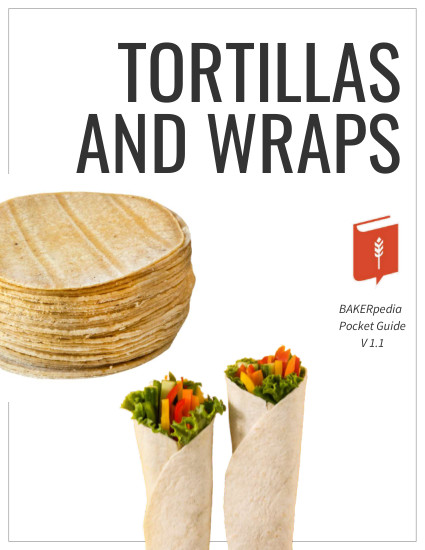Take Your Tortillas to the Next Level!

Taco Tuesdays are certainly a sign of the times! Tortillas and wraps have carved out a substantial niche in the baking and food industries within the last twenty years. With their growing popularity across the globe, fueled by consumer demand for convenience, versatility, and diverse flavor profiles, understanding the intricacies of tortilla production is essential for any baker looking to capitalize on this booming market. Get the technical tips you need to take advantage of this skyrocketing bakery trend!
The Tortilla Market Boom
Tortillas and wraps have transcended their traditional roots, becoming a staple in numerous cuisines worldwide. This surge in popularity is driven by several factors, including the increasing preference for healthier, on-the-go meals and the versatility of tortillas as a base for a wide range of dishes. The market for tortillas is expanding, with opportunities emerging in both the retail and food service sectors. As a commercial baker, recognizing these trends can open doors to new product lines, innovation, and market expansion.
Understanding Tortillas and Wraps
At their core, tortillas and wraps are thin, flatbreads made from a variety of ingredients. Traditionally, tortillas are categorized into two main types: flour tortillas and corn tortillas. Wheat flour tortillas are typically soft and pliable and used in a variety of wraps and burritos. Corn tortillas, on the other hand, are made from masa (a dough made from a special type of corn flour) and are a staple in Mexican cuisine, known for their distinct flavor and texture.
Beyond these traditional varieties, there are numerous variations in the market today, including whole wheat, flavored, gluten-free, and even low-carb tortillas. Each type of tortilla or wrap offers unique qualities and requires specific production techniques to achieve the desired characteristics.
To learn more, download the guide:

Ingredients: The Building Blocks of Tortillas and Wraps
The primary ingredients in tortilla and wrap production include flour, water, sugar, fat, and, occasionally, yeast. Each ingredient plays a critical role in determining the texture, flavor, and overall quality of the final product.
- Flour: The type and quality of flour significantly affect the tortilla’s texture and flavor. Wheat flour, used in flour tortillas, should have a moderate protein content to ensure a soft yet durable tortilla. For corn tortillas, masa harina is essential to achieve the characteristic texture and flavor.
- Water: Water is crucial for hydrating the flour and forming the dough. The flour’s water absorption rate impacts dough consistency and, ultimately, the texture of the tortilla.
- Sugar: While not always used in large quantities, sugar can enhance the flavor and help in browning during cooking.
- Fat: Fat contributes to the tortilla’s tenderness and shelf life. Common fats used include lard, shortening, and vegetable oil. The type and amount of fat must be carefully controlled to maintain the desired texture.
- Yeast: While not typical in traditional tortilla recipes, yeast may be used in certain variations to add a slight rise and different texture to the finished product.
From Dough to Tortilla
The processing of tortillas varies slightly depending on whether you are making wheat flour tortillas or corn tortillas.
- Wheat Flour Tortillas: The process involves mixing the ingredients into a dough, resting the dough to allow the gluten to relax, dividing it into smaller portions, and then pressing or rolling each portion into a thin, round shape. The tortillas are then cooked on a hot griddle or tortilla press until golden brown.
- Corn Tortillas: The process begins with nixtamalization, where corn kernels are soaked and cooked in an alkaline solution and then ground into masa. This masa is then shaped into balls, pressed into thin rounds, and cooked similarly to flour tortillas.
The formulation of tortillas and wraps is a delicate balance. Factors such as ingredient quality, mixing times, and resting periods must be carefully controlled to produce tortillas with the desired qualities—softness, flexibility, and flavor.
Quality Through Parameters and Measurement
It’s important to keep an eye on quality control during tortilla and wrap production. Key parameters include moisture content, pH levels, texture, and shelf life. Regular testing and monitoring during production ensure that each batch meets the required standards and that you minimize waste while maximizing yield. Techniques such as texture analysis and sensory evaluation are essential tools for maintaining consistent quality.
Solving Common Issues
Common issues in tortillas and wrap production include cracking, excessive browning, and poor shelf life. Troubleshooting these problems often involves adjusting ingredient ratios, mixing times, or cooking temperatures to achieve the desired outcome. Mastering tortilla production requires a blend of technical knowledge, precise formulation, and meticulous quality control. With our Tortillas and Wraps Pocket Guide, you’ll be able to understand the key ingredients, processing techniques, and quality parameters, allowing you to tap into the growing market for tortillas and wraps, delivering products that meet consumer demands and stand out in a competitive market.
Want to stay up-to-date with BAKERpedia? Sign up for our newsletter today!

